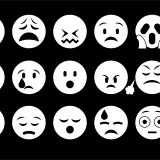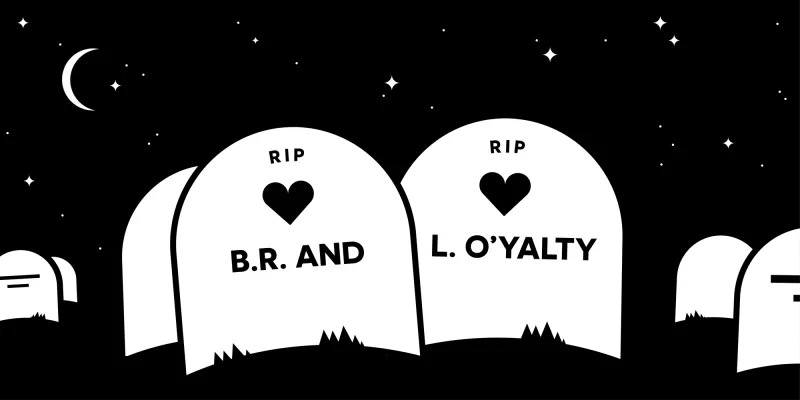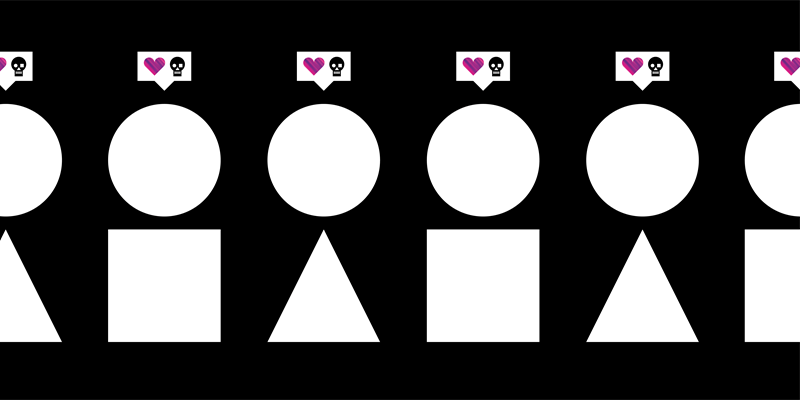


The death of brand loyalty

We all have brands we hold dear, whether you look forward to the John Lewis Christmas ad each year or you would only every buy that L’Oréal face cream. But how far does your loyalty actually stretch? I’m loyal to a point, I guess - I have those few brands I would choose between on the weekly shop. For example, I have two or three shampoo & conditioner brands in my shower at home but I’m not deadly loyal to just one of them. So, I wondered why marketeers hold this idea of loyalty so highly?
Wikipedia defines brand loyalty as “positive feelings towards a brand and dedication to purchase the same product or service repeatedly now and in the future from the same brand, regardless of a competitor’s actions or changes in the environment”. But is this really how consumers shop today or think about our brands? Is our changing culture and globalisation just giving us more choice than we ever thought possible?
Obviously, loyalty is a marketeer’s dream. Considered the bread and butter of what keeps a business alive, it of course goes hand in hand with customer retention & repurchase. But can a marketeer really rely on consumer loyalty to grow their business? Evidence suggests that brand loyalty is slipping, with 90% of common household goods brands losing market share in certain low-growth categories, according to a 2015 study by digital and consumer loyalty firm Catalina.
I guess just because you’ve always bought Heinz Beans doesn’t mean you always will. Its obvious for all to see that our retail landscape has dramatically changed in the last two decades, with the invasion of the German discount retailers and rise of the mighty Amazon giving us more choice and information than ever before.
So, is the answer creating real brand love? A ‘Lovemark’, to build a deeper emotional connection between brand & consumer?
Having worked with Saatchi & Saatchi in my P&G days I was introduced to “Lovemarks” over 10 years ago. The concept was simple “Lovemarks” intended to replace the idea of brand. In his book of the same name, Kevin Roberts (CEO Saatchi & Saatchi) claims, "Brands are running out of juice". He considers that love is what is needed to rescue brands. Roberts asks, "What builds loyalty that goes beyond reason? What makes a truly great love stand out?"
Investigating this idea further I found revered marketer Kevin Duncan describes the concept in more traditional marketing terms, noting that there are "two axes," one of which runs from low to high respect, and the other which runs from low to high love. For a brand to transcend into "lovemark" category, it must be high on both axes at once. Duncan sums up the concept in one sentence "Creating loyalty beyond reason requires emotional connections that generate the highest levels of love and respect for your brand".
Naturally some marketers question the usefulness of the Lovemarks concept. A recent study tested whether one of Robert's Lovemarks - Nike - actually enjoyed higher than expected brand loyalty. The study, based on analysis of TNS consumer panel data, found Nike did not exhibit higher than usual loyalty.
So, if love is not enough to drive loyalty how do we use brand, arguably one of our most valuable business tools ever invented, to grow our businesses?
Byron Sharp confronted this problem and described our change in buying philosophy with his 2010 book How Brands Grow and the revelation that 20% of your brand's biggest buyers don't really account for 80% of sales. It transpires that these apparently "loyal" consumers aren't really that loyal. He concluded that the best way to grow is to get more sales from consumers who care even less about your brand than the loyalists. And that buyers of different brands are fairly similar despite marketeers most obsessive data segmentation efforts. He goes on to explain that consumers are more likely to buy based on emotion and because your marketing has been embedded into their memories with well-worn brand characteristics like logo, colour, scent or ad taglines.
"Sales growth won't come from relentlessly targeting a particular segment of a brand's buyers," Sharp said. "This fantasy is harming marketing effectiveness." Byron explains that we are all polygamist consumers. We're loyal, but within a range of things, which is why people generally have two or three types of shampoo in their shower.
If Sharp's theory is right, it would change everything. It is all about recognising that a brand's consumers come and go, so winning means winning more often and requires broad reach. From my own personal experience working on brands like Clairol, Gillette, Wella and Pantene, the brands have always preformed at their best when the campaigns have been intuitive, inclusive and far reaching rather than focused on the niche. Done well, focusing on the biggest brand (hero) within a range or portfolio can also create a halo effect, driving valuable sales across the total brand. And how do we drive this broad awareness – TV. I know, I know, we are all so focused on ensuring we spend the right amount on digital and engage that influencer but at the end of the day TV is far from dead. It continues to be the most effective mass reaching media channel available to marketeers, essential for driving subconscious awareness and consideration of our brands.
Interestingly, Unilever Chief Marketing and Communications Officer, Keith Weed, said he's a fan of Byron Sharp's work and its focus on the importance of broad reach to get more business from lighter buyers of a brand. "If you get too targeted, you reinforce people who love your brands to use more," he said "There are only so many cups of tea you can drink in a day".
And it’s true, just getting your core shoppers to buy more does not drive your business over time, it just locks these people out of the market with their panty’s piled high.
So as our world and culture evolves and the traditional thinking behind brand loyalty dies, it’s important that brands learn valuable lessons around broader reaching campaigns, creating genuine brand purpose that attracts the masses and creates more dynamic emotional connections with consumers. Otherwise brand loyalty will be the death of your brand.
Posted 22 October 2018